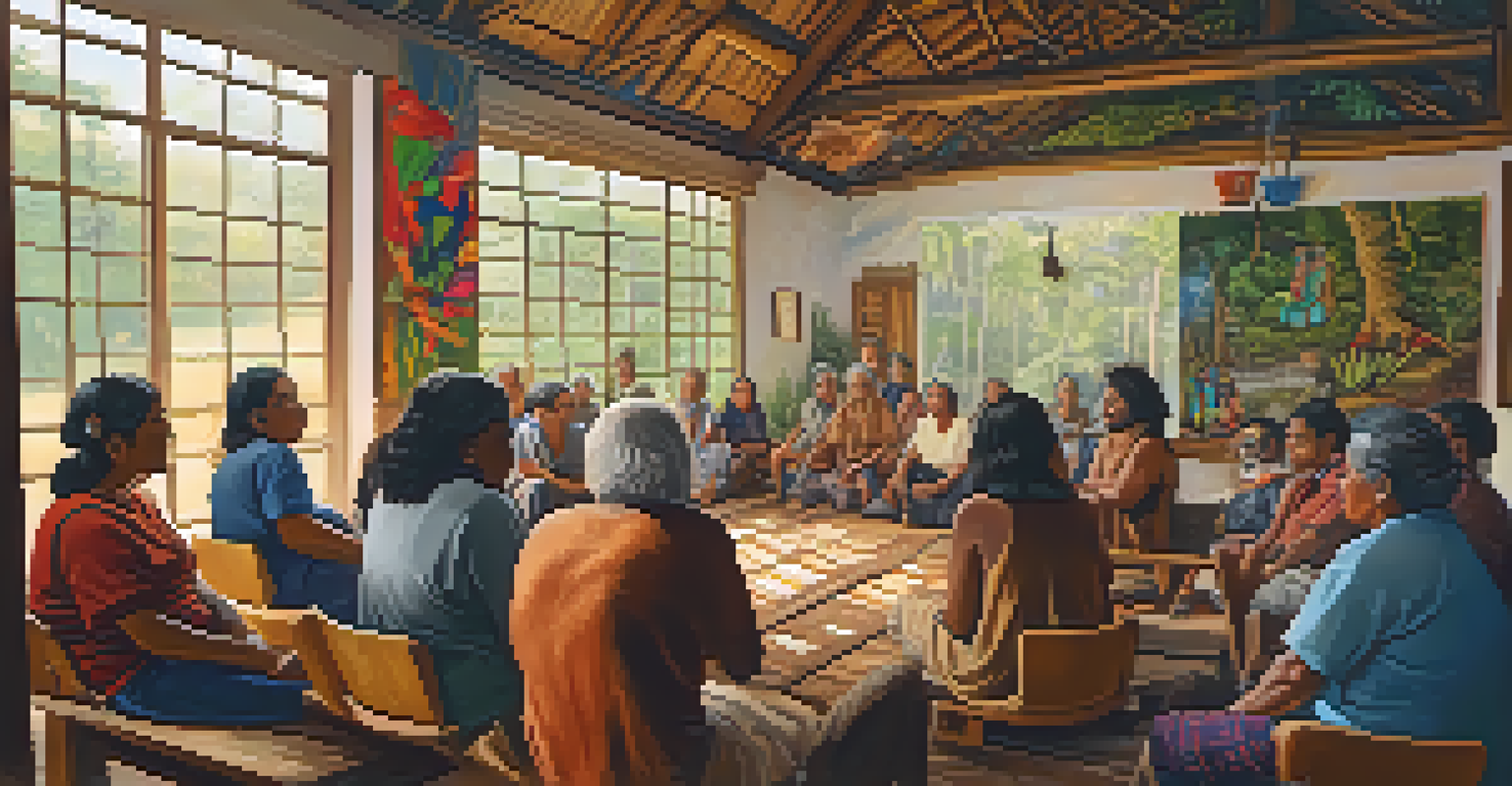The Role of Indigenous Knowledge in Sustainable Ayahuasca Use

Understanding Ayahuasca: Cultural and Spiritual Significance
Ayahuasca, a powerful brew made from Amazonian plants, holds deep cultural and spiritual significance for Indigenous communities. Traditionally, it is used in ceremonial contexts to foster healing and spiritual connection. The unique properties of ayahuasca stem from its active compounds, primarily DMT, which induce profound introspection and visions.
Indigenous peoples have a rich and sophisticated understanding of their ecosystems, developed over centuries of hands-on experience.
For Indigenous peoples, ayahuasca is more than just a substance; it is a sacred tool for navigating the spiritual realm. The rituals surrounding its use are steeped in centuries of knowledge and practice, ensuring that its consumption aligns with cultural beliefs and communal values. This holistic approach emphasizes respect for nature and the interconnectedness of all living beings.
Understanding the cultural backdrop of ayahuasca enriches our appreciation of its role in these communities. It highlights the importance of preserving Indigenous practices and knowledge systems, which are essential for sustainable and respectful use of this potent brew.
Indigenous Knowledge: A Foundation for Sustainability
Indigenous knowledge encompasses a wealth of understanding about local ecosystems and sustainable practices that have been honed over generations. This knowledge includes techniques for cultivating ayahuasca plants responsibly, ensuring biodiversity, and maintaining ecological balance. Such practices reflect a deep respect for the environment, which is often lacking in modern approaches.

By prioritizing sustainability, Indigenous communities demonstrate that their relationship with nature is reciprocal—what they take from the land, they give back through careful stewardship. This symbiotic relationship contrasts sharply with exploitative practices that can lead to environmental degradation. The wisdom of these communities serves as a crucial model for sustainable resource management.
Cultural Importance of Ayahuasca
Ayahuasca serves as a sacred tool for Indigenous communities, facilitating healing and spiritual connection through centuries-old rituals.
Integrating Indigenous knowledge into broader sustainability efforts can enhance conservation initiatives and promote responsible consumption of ayahuasca. It encourages a holistic view of nature, where every element is valued and preserved for future generations.
Challenges Facing Indigenous Communities Today
Despite their rich heritage, Indigenous communities face numerous challenges, including land encroachment, climate change, and cultural erosion. These issues threaten their traditional practices and the sustainable use of ayahuasca. As demand for ayahuasca grows globally, there is an increasing risk of exploitation and commercialization that undermines Indigenous rights.
The greatest threat to our planet is the belief that someone else will save it.
The shift from traditional use to commodification can lead to environmental harm, as unsustainable harvesting practices are employed to meet rising demand. This not only jeopardizes the ecosystem but also dilutes the cultural significance of ayahuasca, transforming it into a mere product rather than a sacred element of Indigenous identity.
Addressing these challenges requires a concerted effort to respect Indigenous rights and empower communities to maintain their cultural practices. Advocacy for land rights and sustainable practices is essential to protect both the environment and the heritage of those who have long been its stewards.
The Importance of Respectful Ayahuasca Practices
Respectful ayahuasca practices involve recognizing and honoring the cultural significance of the brew. This includes understanding the rituals, the role of the shaman, and the spiritual intentions behind its use. When individuals approach ayahuasca with respect, they are more likely to experience its benefits in a meaningful way.
It's essential for outsiders to engage with Indigenous communities and learn from their experiences rather than appropriating their practices. Building genuine relationships can lead to a more profound appreciation for ayahuasca and its role in Indigenous cultures. This respect fosters an environment of shared knowledge and mutual support.
Sustainability Through Indigenous Knowledge
Indigenous practices promote ecological balance and sustainability, demonstrating a reciprocal relationship with nature that modern approaches often overlook.
By prioritizing respectful practices, we can help ensure that ayahuasca's use remains sustainable and culturally relevant. This approach not only honors Indigenous traditions but also contributes to a more ethical and responsible ayahuasca movement.
Integrating Indigenous Wisdom into Modern Practices
To ensure the sustainable use of ayahuasca, it's vital to integrate Indigenous wisdom into modern practices. This means collaborating with Indigenous communities to develop guidelines that respect their knowledge and traditions. Such partnerships can create a framework for sustainable harvesting and consumption that benefits both the environment and the communities involved.
Incorporating Indigenous perspectives into policy-making can also lead to more effective conservation strategies. By valuing Indigenous voices, we can create policies that reflect a deeper understanding of ecological balance and cultural significance. This collaborative approach can help mitigate the negative impacts of commercialization on ayahuasca use.
Ultimately, blending Indigenous wisdom with modern practices allows for a more holistic view of sustainability. It highlights the need for respect, collaboration, and a commitment to preserving both the environment and cultural heritage.
Education and Awareness: Key to Sustainable Use
Education plays a crucial role in promoting sustainable ayahuasca practices. By raising awareness about the cultural significance and ecological impacts of ayahuasca, we can foster a greater appreciation for Indigenous knowledge. This understanding encourages responsible consumption and supports the rights of Indigenous communities.
Workshops, documentaries, and community events can serve as platforms for sharing Indigenous stories and practices related to ayahuasca. These educational initiatives empower individuals to make informed choices about their use of ayahuasca and avoid exploitation. They also help bridge the gap between Indigenous and non-Indigenous peoples.
Challenges to Indigenous Practices
Indigenous communities face significant threats from commercialization and environmental degradation, jeopardizing their cultural heritage and sustainable use of ayahuasca.
As more people become aware of the importance of sustainable practices, the potential for positive change increases. Education not only benefits individuals but also strengthens the collective effort to honor Indigenous knowledge and promote a sustainable future for ayahuasca.
The Future of Ayahuasca: A Path Toward Sustainability
The future of ayahuasca hinges on our ability to embrace sustainability and respect for Indigenous knowledge. As interest in ayahuasca continues to grow, it is essential to prioritize the voices and practices of Indigenous communities. By doing so, we can help ensure that ayahuasca remains a sacred and sustainable resource.
This path forward requires collaboration, education, and advocacy. Engaging with Indigenous peoples in meaningful ways allows us to learn from their experiences and insights, fostering a more equitable relationship. It also enhances our understanding of ayahuasca as a cultural and spiritual tool rather than merely a commodity.

Ultimately, creating a sustainable future for ayahuasca involves a commitment to respect, responsibility, and reciprocity. By aligning our practices with the wisdom of Indigenous communities, we can cultivate a healthier relationship with this powerful brew and the ecosystems that support it.